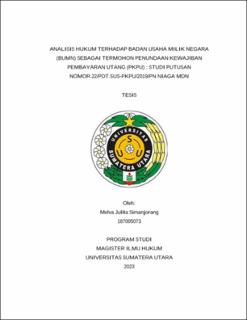| dc.contributor.advisor | Sunarmi | |
| dc.contributor.advisor | Saidin | |
| dc.contributor.advisor | Sukarja, Detania | |
| dc.contributor.author | Simanjorang, Melva Julita | |
| dc.date.accessioned | 2024-11-12T06:07:50Z | |
| dc.date.available | 2024-11-12T06:07:50Z | |
| dc.date.issued | 2023 | |
| dc.identifier.uri | https://repositori.usu.ac.id/handle/123456789/98712 | |
| dc.description.abstract | The phrase "public interest" in Article 2 of the Bankruptcy and Suspension of Debt Payment Obligations Law remains ambiguous in practice. The legal certainty regarding whether a BUMN subsidiary is classified as a BUMN is still debated. Consequently, the interpretation of whether a PKPU petition can be filed against BUMN and its subsidiaries varies. This study analyzes decision Number 22/PDT.SUS-PKPU/2019/PN Niaga Mdn, which rejected a PKPU petition against PTPN I by its creditors on the grounds that only the Minister of Finance had the authority to file such a petition. PTPN I is a subsidiary of the BUMN PTPN III, raising questions about whether PTPN I qualifies as a BUMN engaged in public interest. The research questions are: 1) What is the position of BUMN subsidiaries in legal regulations? 2) What are the authorities for filing a PKPU petition against BUMN? 3) What is the legal certainty regarding the PKPU petition against BUMN as the respondent in decision Number 22/Pdt.Sus-PKPU/2019/PN Niaga Mdn?
The method used in writing this thesis is the Normative Research Method, namely a research method on statutory regulations both from the perspective of the hierarchy of statutory regulations (vertical) as well as the harmonious relationship of legislation (horizontal) and decision analysis.
The research results found that regarding the PKPU application requested by the creditor in the decision, the regulations were in accordance with the explanation of Article 2 of the Bankruptcy Law and Postponement of Debt Payment. For state-owned companies other than the Perum type, Postponement of Debt Payment can be applied for by a director other than the Minister of Finance. In this decision, PTPN I, which is a subsidiary of a State-owned enterprises, is given the same treatment as a State-owned enterprises in the form of a Perum, even though PTPN I is a company in the form of a limited liability company whose shares are still divided even though the entire share comes from state finances. This creates differences of opinion and there is no certainty regarding the status of State-owned enterprises subsidiaries. | en_US |
| dc.language.iso | id | en_US |
| dc.publisher | Universitas Sumatera Utara | en_US |
| dc.subject | State-owned enterprises Subsidiaries | en_US |
| dc.subject | BUMN | en_US |
| dc.subject | Minister of Finance | en_US |
| dc.subject | Postponement of Debt Payment | en_US |
| dc.title | Analisis Hukum terhadap Badan Usaha Milik Negara (BUMN) sebagai Termohon Penundaan Kewajiban Pembayaran Utang (PKPU) : Studi Putusan Nomor 22/PDT.SUS-PKPU/2019/PN Niaga Mdn | en_US |
| dc.title.alternative | Legal Analysis of State-Owned Enterprises (BUMN) as Respondents to Postponement of Debt Payment Obligations (PKPU): Study of Decision Number 22/PDT.SUS-PKPU/2019/PN Niaga Mdn | en_US |
| dc.type | Thesis | en_US |
| dc.identifier.nim | NIM187005073 | |
| dc.identifier.nidn | NIDN0015026304 | |
| dc.identifier.nidn | NIDN0013026203 | |
| dc.identifier.nidn | NIDN0011098301 | |
| dc.identifier.kodeprodi | KODEPRODI74101#Ilmu Hukum | |
| dc.description.pages | 138 Pages | en_US |
| dc.description.type | Tesis Magister | en_US |
| dc.subject.sdgs | SDGs 16. Peace, Justice And Strong Institutions | en_US |


